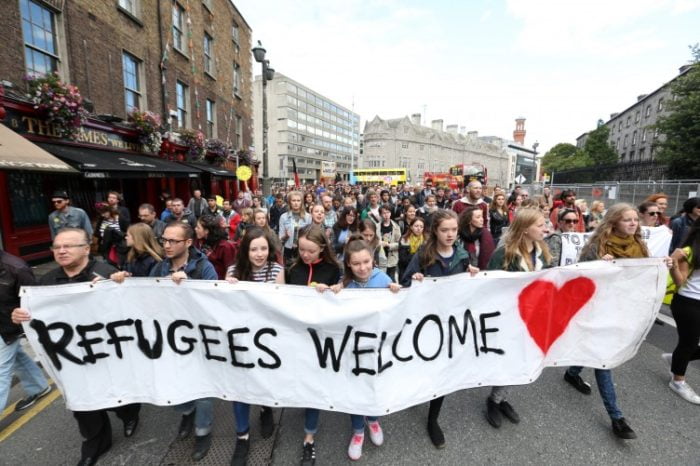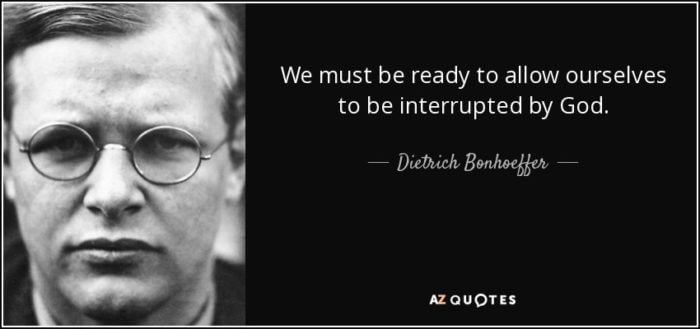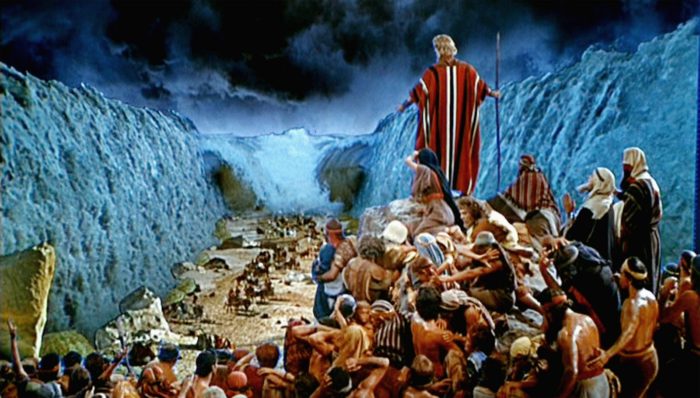 Welcome to a new series of posts here at Preacher on the Plaza at the beginning of every week from now until who knows when . . Wresting with how do we live in these days? These very hard days as people of faith. How do we live in these days of discrimination? Of Hate? Of fears realized?
Welcome to a new series of posts here at Preacher on the Plaza at the beginning of every week from now until who knows when . . Wresting with how do we live in these days? These very hard days as people of faith. How do we live in these days of discrimination? Of Hate? Of fears realized?
If these aren't questions you resonate with, feel free to stop reading. But for those of us deeply concerned about the tone of our country, our relationships with our muslim brothers and sisters, our inclusion of our brothers and sisters of color and our brothers and sisters who are LGBTQ, and most of all with our relations as an American people with the rest of the world, check back here every Monday for some encouragement. We're in this together. And I want to keep having conversations that matter right now.
Yesterday, I heard a sermon from the Old Testament lectionary text, Micah 6:1-8-- one of my favorite scriptures which contains these words.
"He has told you, O mortal, what is good;
and what does the Lord require of you
but to do justice, and to love kindness,
and to walk humbly with your God?"
The sermon challenged us to consider what our religious practice looked like. Is our religion for the sake of doing religion? Or is our religion living out what the Lord requires of us?
Afterwards, I couldn't help but let my mind keep wondering over these verses again and again. I've certainly preached on them many times myself. It's a text that helped form my essays to seminary-- why I felt called to ministry. I even have a re-usable grocery bag with Micah 6:8 on it (A great conversation starter at the grocery bagging table).
But for the first time yesterday, I considered the relationship between the three key words in the verse.
Justice.
Kindness.
Humility
Justice is such a hot button word in Christian communities these days, isn't it?
Church folk speak of "justice" as the reason why their faith seems all the more political.
Justice is what led hundred of thousands to protest a week ago last Saturday at women's marches all over the country. Justice is what moved thousands of people on Saturday to drop everything they were doing and protest at airports all around the country chanting "No hate. No fear. All people are welcome here." Justice is what is leading thousands today to jam up the lines of their Congressional representatives and fill their Senator's boxes with "I need to share with you my concerns . . . " mail.
I am a fan of justice. We need to keep making our voice heard as people who believe that God loves and welcomes us all the same (though America's policies do not right now).
But, next comes kindness. Micah says the Lord asks us to "love kindness."
Some translations of this text insert the word "mercy" instead of kindness. I like mercy too. For living a life of mercy means in acting in compassion or forgiveness toward others. It means looking beyond what a person deserves and loving him or her as a beloved child of God, just the same as you want to be treated.
When I was at the Women's March in DC, this sign was one of my favorites.
Because on a day full of calling our country toward more just policies and relationships-- here was a woman with her heels firmly planted in the ground of kindness. She wants her country to be kind again.
There's a reason I believe that we're called to kindness after our call to justice.
For if we want our messages to have any chance of shining through to hearts who need to hear them, we always must remember to be kind.
Kindness can look like stopping to have a conversation with someone who thinks differently than you in the airport or in a pew at church. It can look like smiling. Opening doors for strangers. Going out of your way to lift someone up who is discouraged. Most of listening (and not posting too quickly on Facebook).
I picture justice and kindness are social activism twins. We can't have one without the other and be effective.
And lastly we are asked to "walk humbly with our God."
In a journey of faith, humility is an essential virtue, we're reminded.
Because after all, God is God and we are not.
And if this is true, sometimes we're going to be wrong. Sometimes we're going to miss the mark. We're going to speak to soon or not soon enough. We're going to make a mountain out of a molehill and cause more damage than the goodness we bring.
So, if our justice wrapped in kindness work is truly going to be what God wants from us-- we've got to walk humbly.
We've got to stay connected to our life-source. We've got to take times out to pray, to think and to re-focus. We've got to move in the spirit of Thomas Merton's famous prayer: "The fact that I think I am following your will doesn't mean that I am actually doing so."
My friends for today: where and how is God calling you to do justice, love kindness and walk humbly with your God?
We've got work to do.
A sermon preached at North Chevy Chase Christian Church on Exodus 14:10-31
What does it mean to live with intentional courage?
I was thinking this week about some of my “courage heroes” and the first one who came to mind was Dietrich Bonhoeffer.
I bet many of you have read some of his books—two of my favorite are Life Together and The Cost of Discipleship.
Or I bet you’ve heard other preachers like me refer to him in sermons or in Bible Studies.
He’s a modern saint to many and if you don’t know much about him here’s the basic scoop: Dietrich Bonhoeffer was not a Lutheran pastor/scholar with a last name that is not only hard to spell, but he was a leader in the German church. In this ministry he quietly taught German students to reject Nazism until 1939. But also that time, he received a great job offer in America to teach at Union Theological Seminary in New York City and left his home country. It was all he ever wanted for his life (or so he thought).
But, within a month, he made the decision to quit this "dream job.” He felt it in his heart that he needed to stop running away from a situation that needed a voice of justice in it. Simply put, he knew God was calling him to speak and go back home.
He wrote around that time: "I have come to the conclusion that I made a mistake in coming to America. I shall have no right to take part in the restoration of Christian life in Germany after the war unless I share the trials of this time with my people."
Most of all during this time, Bonhoeffer was willing to do anything, he said, to stop his country from going down a destructive path—a path where God’s love for all people could no longer shine through.
As the story goes, Bonhoeffer used family connections to gain a post in the military intelligence unit, where he operated as a double agent. There he helped arrange for a bomb to explode at the Führer's headquarters on July 20, 1944. But Hitler was only wounded, and Bonhoeffer, 38 and engaged to be married, was among the dozens arrested.
Bonhoeffer put everything, literally everything on the line to be used in service. Though many in his family call him stupid. There were just as many who stood in awe of his courage.
The sad part of the story is that he was hung on April 9, 1945, just days before American troops liberated Flossenbürg.
As I tell you this story I realize that few of you have been given opportunities to stop the most evil of evil plans in this world recently.
Because this is true, Bonhoeffer’s story and his witness often feel to most of us like a removed example of faith--- something that feels so far removed.
And like the story of Bonhoeffer, the Exodus story taken from chapter 14 might fall on our ears in the same way. In hearing it read, we visualize an epic tale only fit for the makings of Hollywood and Charlton Heston. We’d call Moses and the Israelites courageous, yes, but do we relate to walking on dry ground with the waters surrounding us? Actually no, not at all.
Yet, the more I thought of it this week, the more I realized that if we went back in time and interviewed some of the charter members of the "I crossed the Red Sea" club about their courageous act, I'd imagine they'd laugh at our labeling of them.
It wasn’t as if they signed up for a journey, a moment, or even an act of courage like they found themselves in that day on the bank of the Sea. They were just following Moses . . .
Moses who had a call of God to lead the people of out of slavery in Egypt. . . .
Moses who goes to the Pharaoh of Egypt and asks that the people be allowed to go to the desert to worship . . .
Moses who doesn’t take no for an answer when Pharaoh refuses . . .
As a result in their nation, the ten plagues come, ending with the death of all of the first-born sons in the land, including Pharaoh’s.
So, Pharaoh finally says they can go.
Yet, even in what must have been a joyous exit, a celebration of freedom of worship, the Israelites were simply sticking with the plan of what they were told to do: follow Moses.
Sure, it was a choice after all to follow Moses, and they could have stayed back in Egypt, but scripture tells us that most left because why wouldn't you? God seemed to be on their side, Egyptians were giving them gifts for the journey out of fear of their God.
And, these plagues, or visible signs of God's provisions were making the whole journey look easy.
Like setting out for an adventured filled road trip with a map, the first couple of miles within the familiar context of where you've traveled before, always seem easy, right?
It was easy, I suppose until the crowd met the Red Sea.
Verse 11 of text details to us the specific cries complaints: "Was it because there were no graves in Egypt that you have taken us way to die in the wilderness? What have you done to us bringing us out of Egypt? . . . For it would have been better for us to serve the Egyptians than to die in the wilderness."
(Wouldn't you have LOVED to have been Moses in that moment? I know I wouldn't . . . )
For no matter if they like liked it or not, Israel faced their moment of truth, fear or no fear. There was no turning back.
Choice 1: Go back to Egypt and angry Pharaoh
Choice 2: Trust God to lead the way across the sea.
What would be their choice?
You and I know the story, so it is hard to stay at this point for too long. For we know the Lord tells Moses to lift up his hands over the sea. And as Moses stretches his hands over the Red Sea, it parts. Dry ground appears. And, a path for walking become visible.
How scary that moment must have been!
But they were asked to do one thing: walk.
Just walk.
They were asked to walk. Walking forward equaled courage.
Courage for them meant no longer being a passive player in the deliverance that God had for them.
So hard is walking? But it was oh so courageous. It wasn’t like they had previous experience in something like this. It wasn’t like they had time to have pro/ con chart. It wasn’t like they had time to call a church council meeting and discuss how everyone felt about it. They just had to walk right then. It was their God MOMENT.
They were to step with the confidence that thought they may not know what was on the other side, and though they may not have intended to walk across a sea-- maybe never in their lifetime ever and maybe never again-- this was what was next for them.
Just walk.
One step in front of the other.
Walking toward a new future.
I want to tell you this: we don’t have to be Bonhoeffer in Nazi Germany or at the edge of the Rea Sea to face such choices.
Such intentional opportunities are found in the choices in front of us every day-- in such choices that may seem too ordinary, too difficult or even too overwhelming in the big picture, but when presented with the moment to act are the tug on our heart to move.
Just saying no to a homophobic slur.
Stopping to help a distressed looking neighbor.
Visiting someone who might feel forgotten.
And our faith tradition is full of the great cloud of witnesses of those who have also acted with such intentional courage too . . . ordinary people found themselves doing unheard of things because of the love of God compelled them to act. We think of them as “big players” in a movement. But when it all boils down it was just putting one foot in front of the other.
Courage that looked like a tired woman in Alabama in 1954 boarding a bus as she did the same way ever day, but knowing one morning that she'd had enough sitting in the back with the folks who looked just like her. And she sat in the front.
Courage that looks like a young boy named Desmond who thought he’s just be a school teacher, only to find himself called to the pastorate in South Africa. Rev. Tutu who one day knew had to speak out against the un-justice even when it landed him in jail. He could simply not be silent.
Courage that looks like people organizing all over this country right now. . . people going to the streets, people standing in protest lines at City Halls, people showing up in one another’s homes to pray and get to know their neighbors better, saying with their steps it’s time for us in this country to have a conversation about race. That indeed black lives matter.
My dear ones, in times like this is easy to say, "I'm not courageous" and be so overwhelmed by what we hear reported every day on the news.
It's easy to pretend the injustices in the nation are not OUR problem.
It's easy to say: "There's always so one else who can do it better than me" and never really spend the moments and resources of our lives on things with no value.
BUT, if we truly are people who believe that "the Lord will fight for us" who wants us "to go forward" then I believe we've all got some walking to do.
Intentional Walking.